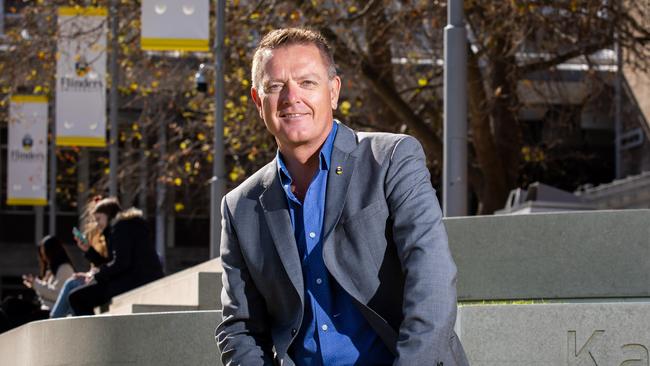SA’s university vice-chancellors discuss potential overhaul of tertiary entrance procedures
SA’s three university vice-chancellors are discussing a significant overhaul of tertiary entrance processes, as concerns grow that the ATAR student ranking system is fundamentally flawed.
- SA’s famous private school alumni (part 1)
- SA’s famous public school alumni (part 1)
- Data series: How schools perform in NAPLAN and SACE
Leaders of the state’s major universities have discussed an overhaul of tertiary entry policies, amid growing discontent with the nation’s student ranking system.
Adelaide University vice-chancellor Peter Rathjen told The Advertiser there was “sustained interest among the three universities in this issue”.
Principals and other experts have been increasingly critical of ATARs for skewing Year 12 subject choices, being too narrow a measure of aptitude for university study, allowing schools to “game the system” and heightening student anxiety and depression.
Universities are gradually introducing a range of alternate entry methods.
But most school leaver admissions are still based solely on ATARs — a national ranking benchmark derived from Year 12 scores.
A particular concern is how high school students drop high-level maths and science subjects in favour of easier Year 12 subjects in order to maximise their ATAR.
They are then less likely to study STEM degrees at university, and those that do are often poorly prepared, in a worrying sign for the state’s economy that needs to take full advantage of the defence and space industries.
The issue was discussed at a meeting of the South Australian Vice-Chancellors’ Committee this week, while the Liberal and Labor parties agreed it was of concern during state parliamentary estimates on Thursday.
“ATARs continue to be an issue that are broadly of concern to the state — to those involved in education, especially universities, to politicians, as well as to parents, and to the students themselves,” Prof Rathjen, speaking as committee chairman, said.
“As leaders in education, we are already discussing ATARs with a view to coming to terms with what best suits the needs of our students and of the state.
“Our focus at all times must be on ensuring South Australia’s young people have the best opportunities for education, leading to meaningful and productive lives.
“I am strongly supportive of the need for informed debate around these issues.”
The discussion has not as yet resulted in an agreement for the three universities to address it together.

Latest figures show that at Adelaide University, 86 per cent of domestic school leaver admissions were based solely on ATAR. For UniSA, it was 79 per cent and Flinders University, 75 per cent.
At Flinders, 15 per cent of school leaver admissions combined ATAR with other criteria, versus 6 per cent at Adelaide and zero at UniSA. More than one in five at UniSA were admitted entirely on non-ATAR factors.
In January, SA Secondary Principals Association president Peter Mader said no student should be admitted to university via ATAR alone.
He said universities should be more like employers, making choices based on knowledge, skills, experience, attitude and potential.
He also pointed to the State Government’s SACE review that found the ATAR system incentivised high school students to prioritise “getting in” over “getting ready” for uni.
Education Minister John Gardner said universities used to be stricter about prerequisite Year 12 subjects for STEM degrees, but that had caused an equity issue because not all high schools could offer those subjects. But now, Year 12s were avoiding those subjects to maximise their ATAR.
Mr Gardner said he would support moves that would help overcome the problems, though entry policies were ultimately up to universities.
“I’m not sure the model is quite right at the moment,” he said.
Opposition education spokeswoman Susan Close said the study of specialist maths and foreign languages in Year 12 had suffered because of the “pretty brutal” ATAR system skewing subject choices.
She said students should feel free to do the Year 12 subjects they were passionate about and urged universities to adjust their entry policies accordingly.

The Advertiser has previously revealed Adelaide University is trialling provisional offers into engineering degrees to Year 11s, if they keep doing high-level maths in Year 12. Flinders University has trialled special “assessment centres” evaluating critical thinking and creativity, also resulting in early offers to Year 11s and 12s.
Domestic school leavers — whether admitted by ATAR alone, ATAR plus other criteria, or entirely by non-ATAR factors — comprise roughly half of Adelaide and Flinders universities’ total undergraduate admissions, and about 40 per cent at UniSA.
The rest come on the basis of previous uni study, including bridging and foundation courses, vocational study, “work and life experience”, or are international students.
Flinders University vice-chancellor Colin Stirling and UniSA vice-chancellor David Lloyd declined to comment.
